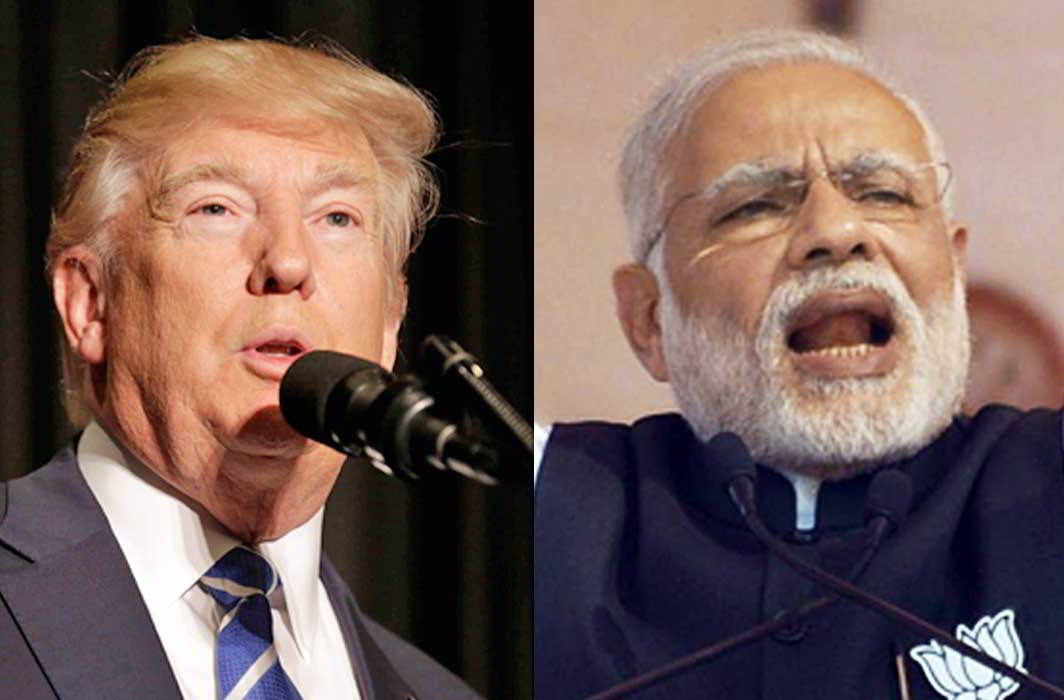[vc_row][vc_column][vc_column_text]A less glamorous trip this time
U.S. President Donald Trump will receive Prime Minister Narendra Modi at White House for the first time on June 26, in the shadow of “pause” like situation in bilateral ties. Recently, Trump, while addressing the nation on U.S. decision to withdraw from Paris Climate Accord, had bracketed India with China as the “biggest polluters” and alleged India’s participation in the accord was only for receiving “billions and billions” of dollars in foreign aid.
According to the sources in Ministry of External Affiars, “Their (Modi and Trump’s) discussions will provide a new direction for deeper bilateral engagement on issues of mutual interest and consolidation of multidimensional strategic partnership between India and the U.S.”
White House press secretary Sean Spicer has said, “Trump looks forward to the June 26 meet with Narendra Modi when two leaders will discuss economic growth, the fight against terrorism, expanding defense cooperation and growing US-India trade.”
He further said, “You can expect the two of them to set forth a vision that will expand the US-India partnership in an ambitious and worthy way. President Trump and Prime Minister Modi will look to outline a common vision for the US-India partnership that is worthy of their (combined) 1.6 billion citizens.”
He reiterated US priority of creating more jobs for Americans saying, “US energy and technologies, including natural gas, are helping to build Prime Minister Modi’s vision for a new India and creating thousands of US jobs in the process.”
The differences between the two countries are over their position on climate change. India has more than once reiterated its position on Paris Climate Accord. Minister of External Affairs Sushma Swaraj rejected Trump’s allegation saying “What Trump said is not the reality”. She was also quoted as saying, “…for some to say that India has signed the agreement because of being presumed or because of greed for foreign air… is completely baseless and unfortunate.”
Prime Minister Narendra Modi, during his recently concluded four-nation Europe tour, also reiterated India’s commitment not only to abide by Paris Climate Accord but to go above and beyond in order to protect the environment. He was quoted saying in French capital as “Paris agreement reflects our duty towards protecting the Earth and our natural resources. We have natural resources because our previous generations protected these resources. We must do the same for our future.”
Prime Minister is also expected to raise the issue of possible changes in American rules on the H1-B visa affecting the Indian IT experts employed in Silicon Valley. Minister of External Affairs Sushma Swaraj had recently said that Modi would raise India’s concern about the issue. According to Pew Research Centre, during years 2011 to 2015, India received largest share of 50.5 percent of 1.8 million H1-B visas for first time employment.
Pakistan sponsored terrorism and other international issues are also expected to figure during Modi-Trump meeting.
U.S. Defense Secretary James Mattis has recently made clear that his country recognizes India as a major defense partner partly out of respect for New Delhi’s “indispensible role” in maintaining stability in the Indian ocean region.
In the changed atmosphere in White House the upcoming Prime Minister Narendra Modi’s visit, is expected to be without “frills” having only a one-on-one interaction with Trump and few other business engagements with US CEOs. This would be in stark contrast with his September 2014 U.S. visit where he addressed large crowds in Madison Square Garden in New York or his big address to a joint meeting of the U.S. Congress in June 2016. Former president Barack Obama, whom Modi met a record eight times had seen India as a strategic partner.
Some observers believe that the visit will be more focused on “getting to know” the new occupant of the White House and bilateral policy outcomes are in the background.[/vc_column_text][/vc_column][/vc_row]


 Latest world news15 hours ago
Latest world news15 hours ago
 Latest world news15 hours ago
Latest world news15 hours ago
 Latest world news15 hours ago
Latest world news15 hours ago
 India News15 hours ago
India News15 hours ago
 India News6 hours ago
India News6 hours ago
 Latest world news6 hours ago
Latest world news6 hours ago


